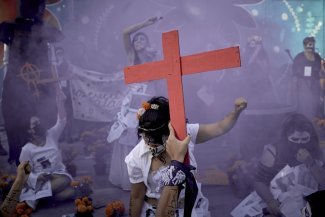Trade unionists are still being killed in Colombia despite commitments assumed in a Labor Action Plan (LAP) agreed with the US government.
Eight members of the US Congress have announced in September that even though progress has been made during the 17 months since the plan was signed, “more work is needed to ensure that its objectives become reality on the ground”.
The agreement on labor rights signed between President Santos and President Obama in April 2011 undertook to offer protection to trade unionists and to take measures to tackle anti-union violence.
This was an essential condition for the ratification of the Free Trade Agreement between both countries by the US Congress.
According to statistics provided by Escuela Nacional Sindical, the main labor monitoring organisation in Colombia, 34 trade unionists have been assassinated and further 485 leaders have received death threats since the LAP has been in effect.
“Although the Labor Action Plan included some important measures, its scope was too limited”, reported in July 2012 the AFL-CIO, the largest federation of unions in the US.
“It fully resolved neither the grave violations of union freedoms nor the continuing violence and threats against unionists and human rights defenders”.
“In addition, there was no specific provision in the LAP requiring Colombia to establish a sustained, meaningful and measurable record of enforcement of any of the commitments prior to a congressional vote on or official entry-into-force of the trade agreement”, concluded.
Free hand to resume violence
In November of 2011, six months before the United States gave Colombia a clean bill of health and allowed the US-Colombia Free Trade Agreement to take effect, paramilitaries invaded the home of Juan Carlos Galvis in Barrancabermeja.
Two black-clad invaders held a gun to the head of Galvis’ daughter and told her mother they would kill her. Another child was bound and gagged.
Then the pair demanded to know where Galvis and his son were. When the family couldn’t tell them, they spray painted slogans on the face and hair of Galvis’ wife, Mary Jackeline Rojas Casteñada, an activist in the Popular Women’s Movement.
This wasn’t the first time paramilitaries went after Galvis and his coworker, William Mendoza. Both have been threatened and attacked for years, because they are leaders of SINALTRAINAL, the union for Coca Cola’s Colombian bottling plants.
In 2003, Galvis’ car was shot up after he got a threat from a paramilitary group called “Death to Unionists.” Mendoza’s wife foiled an attempt to kidnap his young daughter in a public park the year before.
After that, Mendoza moved his family away from the city, as Galvis did following the home invasion. But they will not leave Barrancabermeja themselves.
Both say implementation of the trade agreement has given the Colombian government a free hand in resuming attacks on unionists, despite promises that a Labor Action Plan would protect them.
On December 14, a month after the invasion of Galvis’ home, both he and Mendoza were charged with “terrorism,” as a result of a bomb blast in the local bottling plant fourteen years ago.
The witnesses lined up by the prosecutor are paramilitaries, in prison for the murders of labor and social movement activists.
“Once the agreement was signed, the government wasn’t afraid anymore that a vote in the U.S. Congress might go against them,” Mendoza says. “The Colombian government has tried to use false accusations against us before. But if they put us in jail this time, we’ll never come out alive.”
Paramilitary control
Three men accuse Galvis and Mendoza.
One, Rodrigo Perez Alzate, is the commander of a paramilitary group called the “Central Bolivar Bloc,” in prison because he confessed to 45 murders. Perez says Galvis is a sympathizer with armed guerillas, an accusation historically used against unionists to make them targets.
The second, Wilfred Martinez Giraldo, was in charge of paramilitaries in Barrancabermeja.
The third, Saul Rincon, worked as a guard at the bottling plant and is in prison for murdering the treasurer of the Oil Workers Union (USO) in Barrancabermeja.
“They say,” Mendoza explains, “that a bomb blast, probably set off by the EPL (one of Colombia’s guerrilla groups), was used by the union to pressure the company into making concessions. But that year we actually had to give the company concessions to keep them from closing the plant. We had no connection to the bombing and had nothing to gain from it. The accusation was fabricated years later, and doesn’t even make sense.”
Paramilitary groups have been closely tied to the Colombian military and government for two decades.
In theory, they were demobilized in 2004 and 2005. But in their place, new groups have been formed, such as the Rastrojos. In Barrancabermeja residents say they act just like the old paramilitaries, and control entire sections of the city.
On August 17, the Rastrojos distributed a leaflet announcing: “We are not playing around. It is our last warning to guerrilla organizations that hide behind the rhetoric of defenders of human rights”.
It named SINALTRAINAL and threatened: “We declare our objective to be a death sentence. We have William Mendoza, the guerrilla leader, well identified.”
Over the past two decades, other murdered SINALTRAINAL leaders include Isidro Segundo Gil, Jose Avelino Chicano and Oscar Dario Soto Polo.
When Colombian courts wouldn’t punish the murderers, SINALTRAINAL went into U.S. federal court in Florida in 2000 with the United Steel Workers and the International Labor Rights Fund, charging Coca Cola with responsibility under the Alien Tort Claims Act. Eventually, the Florida court declared that Coke had no control over its Colombian bottlers.
But the case helped pressure negotiators of the free trade agreement into concessions they promised would end the killings – the Labor Action Plan.
Candidates for assassination
Many other unions on the ground confirm that the LAP hasn’t stopped the murders. Jhonsson Torres, a member of the cane cutters union SINALCORTEROS, told a hearing in Washington DC in June that Daniel Aguirre, the union’s general secretary, was assassinated on April 27.
“After our two-month strike was able to improve working conditions, the Colombian government charged several of us and our allies with conspiracy and sedition,” he declared.
Five members of FENSUAGRO, Colombia’s largest union for farm workers, have been killed in Cauca.
The attacks on FENSUAGRO have been so violent that Leo Girard, president of the United Steel Workers, wrote a letter on behalf of his union and the UK union UNITE, to the Colombian government demanding that it act.
FENSUAGRO is a target, Girard says, “because of both its labor and peace activism. In some cases, it appears that the Colombian military itself may be involved in this violence.”
To Edgar Paez, SINALTRAINAL’s international representative, “the paramilitaries are a project of the state to protect transnational corporations in Colombia. Anyone who raises their voice with a different vision is a candidate for assassination.”
The objective, he says, is “a much more favorable environment for the exploitation of our natural resources and our labor force.”









